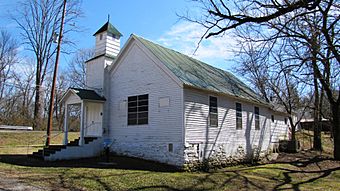Pikeville Chapel African Methodist Episcopal Zion Church facts for kids
Quick facts for kids |
|
|
Pikeville Chapel African Methodist Episcopal Zion Church
|
|
 |
|
| Location | E. Valley Dr., Pikeville, Tennessee |
|---|---|
| Area | 0.5 acres (0.20 ha) |
| Built | 1870 |
| MPS | Rural African-American Churches in Tennessee MPS |
| NRHP reference No. | 99001444 |
| Added to NRHP | November 30, 1999 |
The Pikeville Chapel African Methodist Episcopal Zion Church is a very old and important church. It is located on E. Valley Drive in Pikeville, Tennessee. This church has a special history for African-American people in the area. It was added to a list of important places in 1999.
Contents
Pikeville Chapel Church
A Special Place in History
The church was built a long time ago in 1870. This was during a time called the Reconstruction Era. The Reconstruction Era happened after the American Civil War. It was a time when the United States worked to rebuild the country. It also worked to help formerly enslaved people gain their rights.
This church was used by many different groups of people. It also served as the main school for African-American children. This continued until 1925. That year, a new school was built. It was called the Lincoln School. This new school was a Rosenwald school. Rosenwald schools were special schools built for African-American children in the South. They were built with help from Julius Rosenwald. He was a leader of Sears, Roebuck and Company.
An Old and Active Church
The Pikeville Chapel African Methodist Episcopal Zion Church is very old. It is known as one of the oldest African-American church buildings in Tennessee. Even today, the church still has an active group of people who worship there. It continues to be an important part of the community.
What is the National Register of Historic Places?
The church was added to the National Register of Historic Places in 1999. This is a special list kept by the United States government. It includes buildings, sites, and objects that are important in American history. When a place is on this list, it means it is recognized for its historical value. It also helps to protect these important places for the future.
 | Emma Amos |
 | Edward Mitchell Bannister |
 | Larry D. Alexander |
 | Ernie Barnes |



